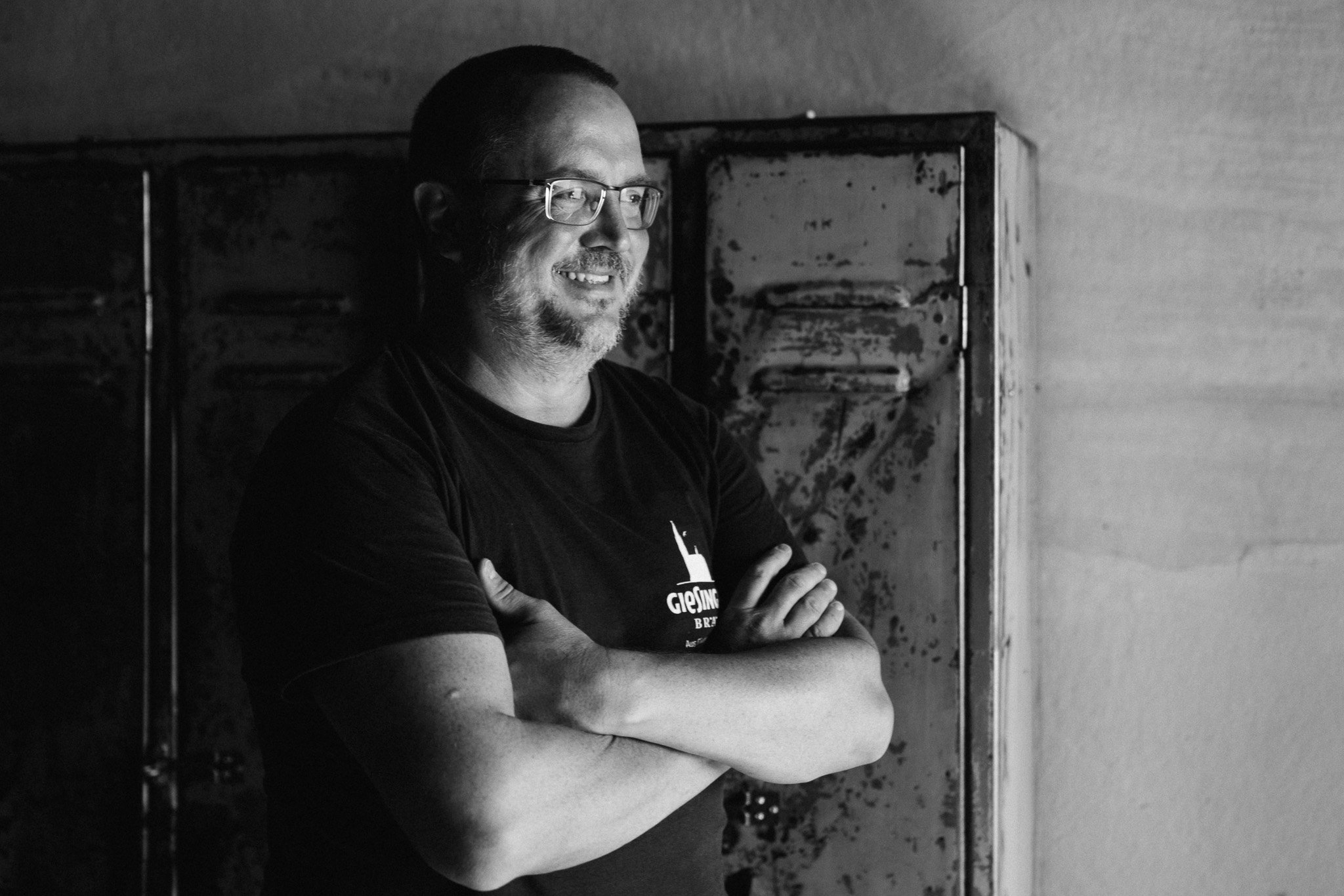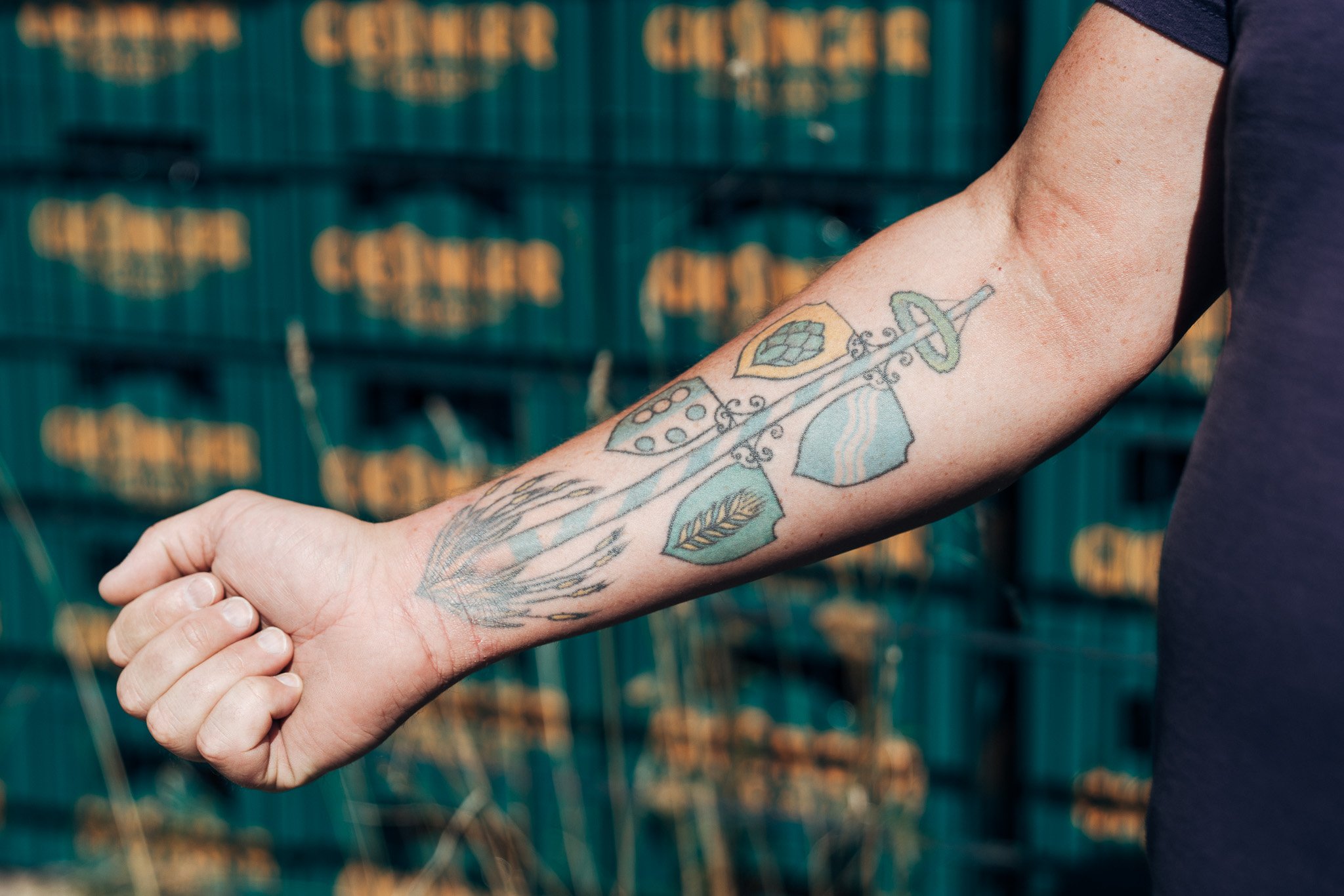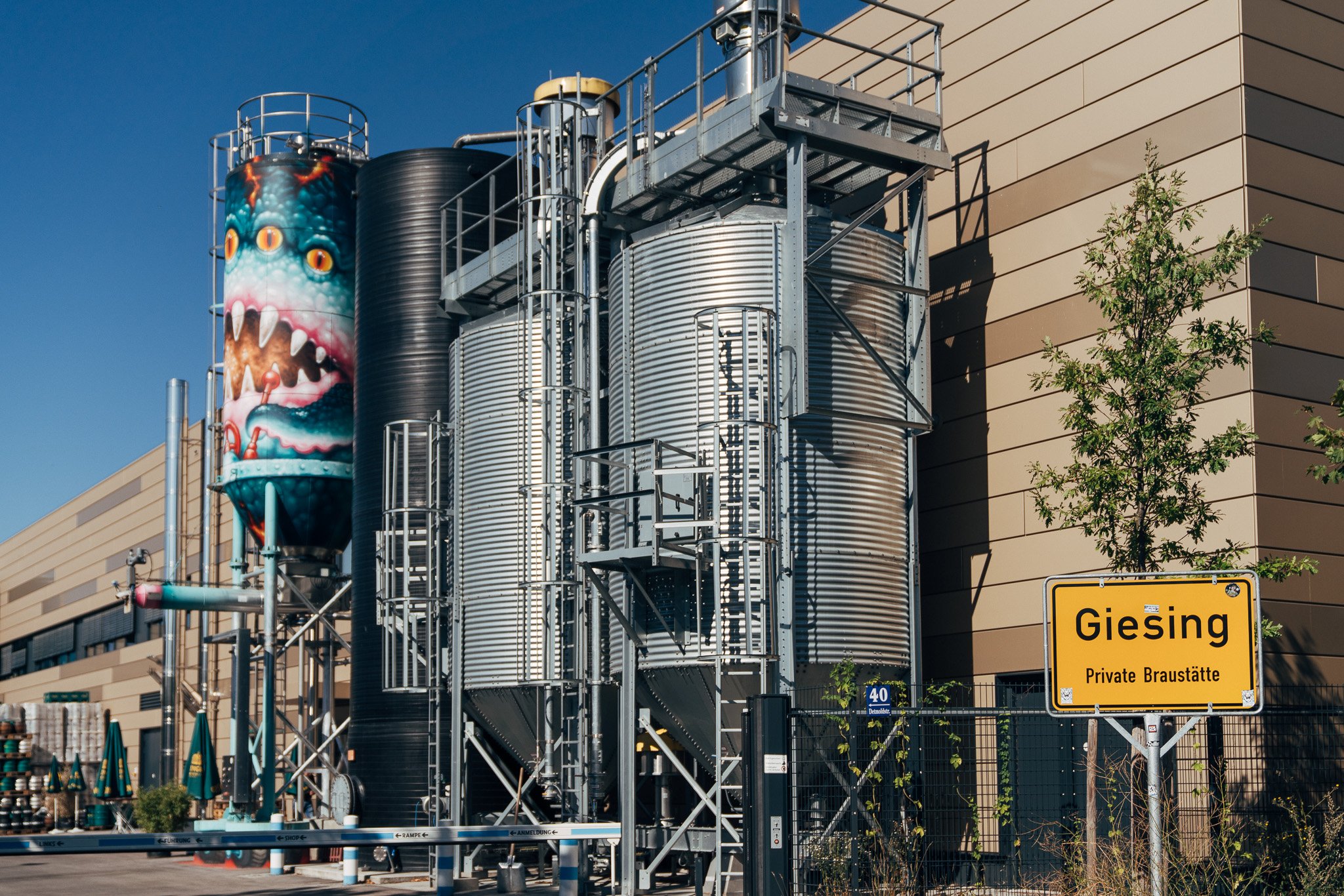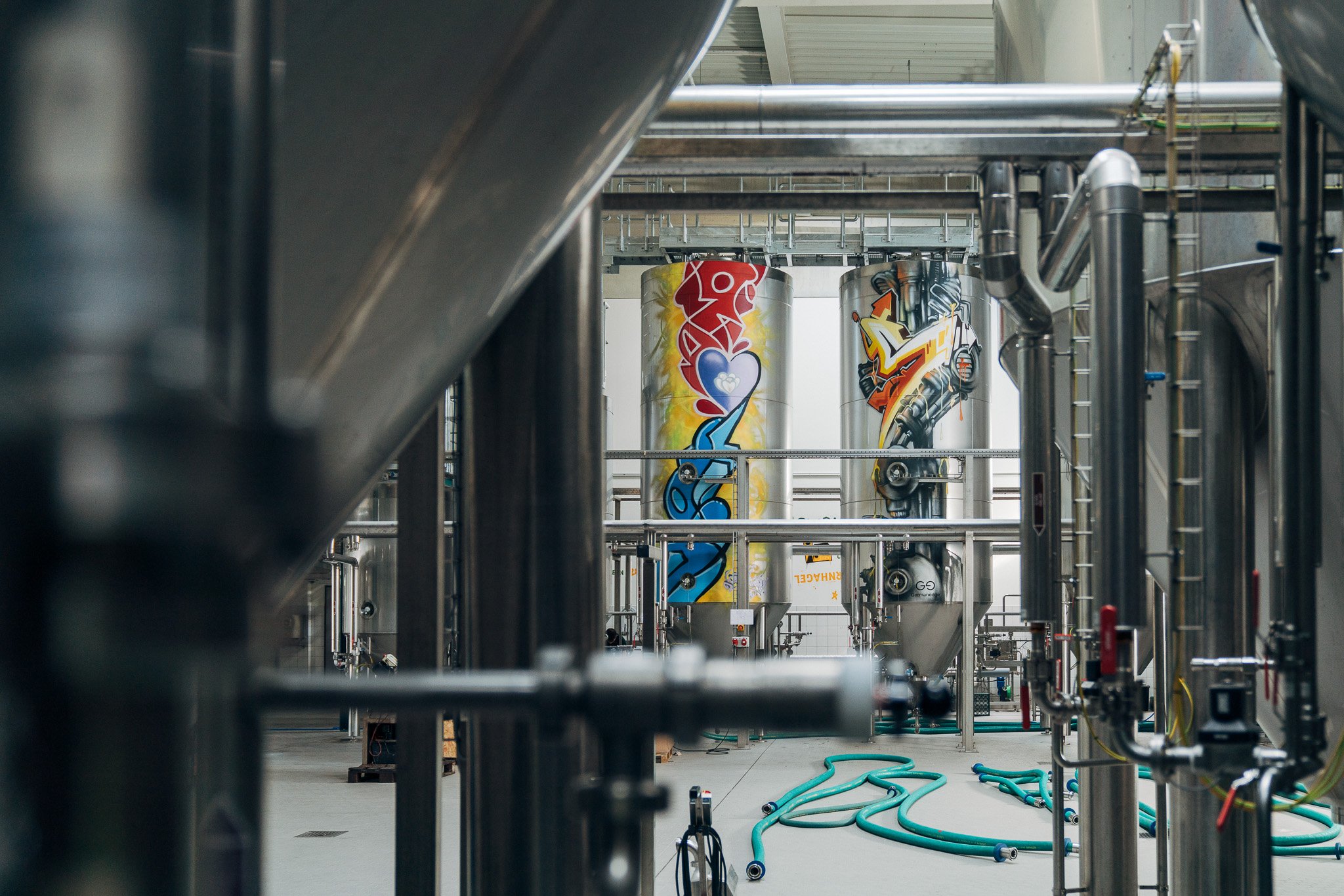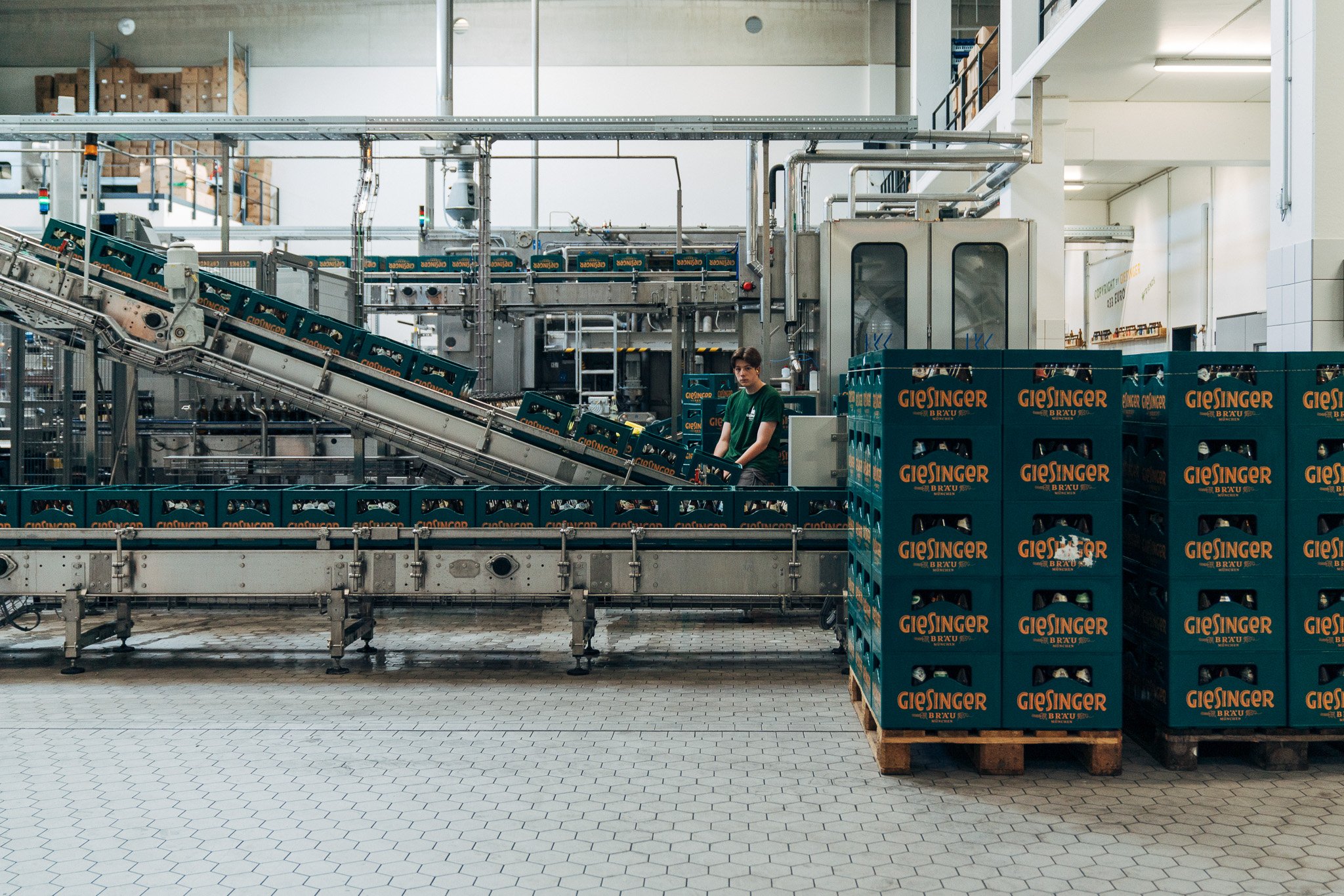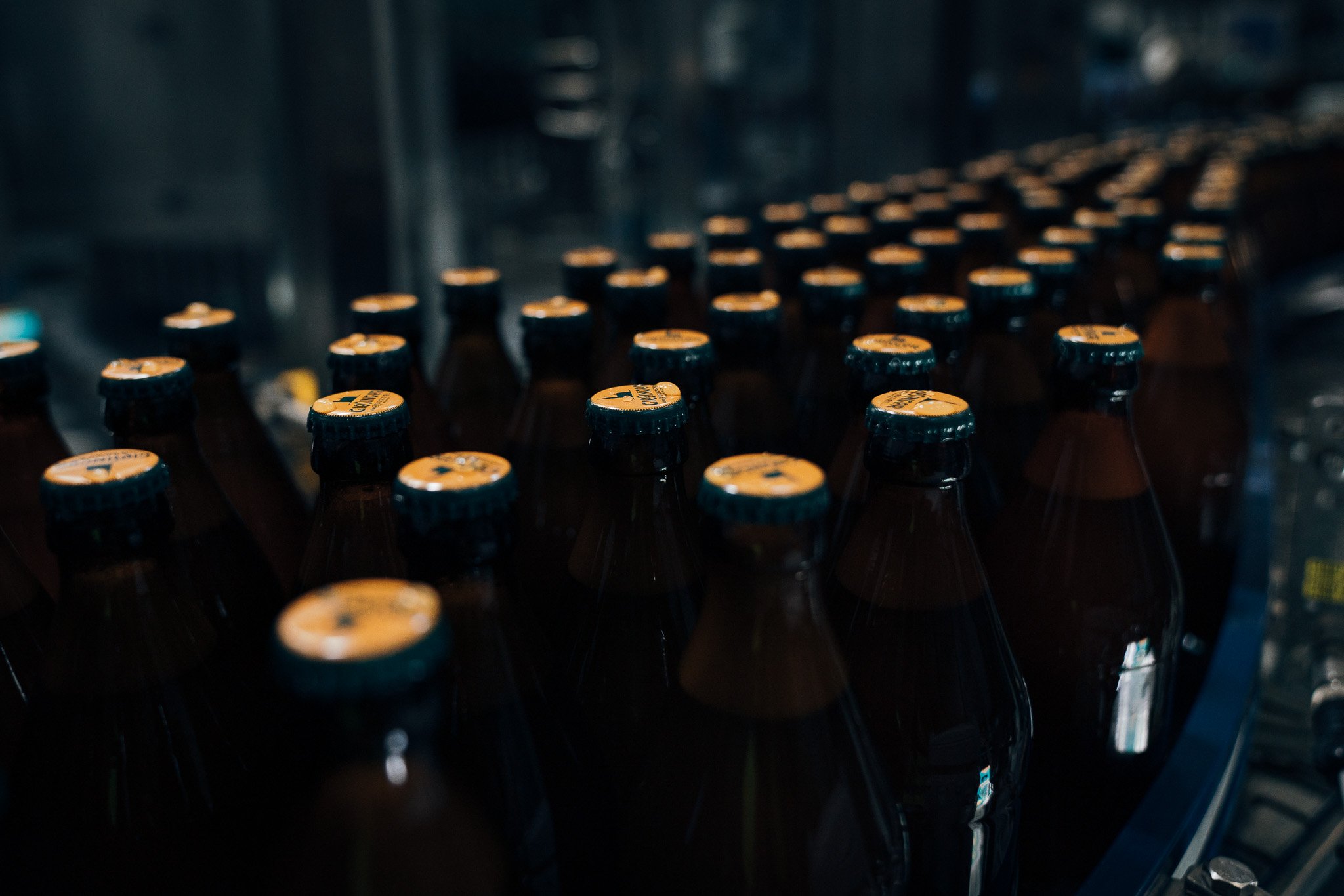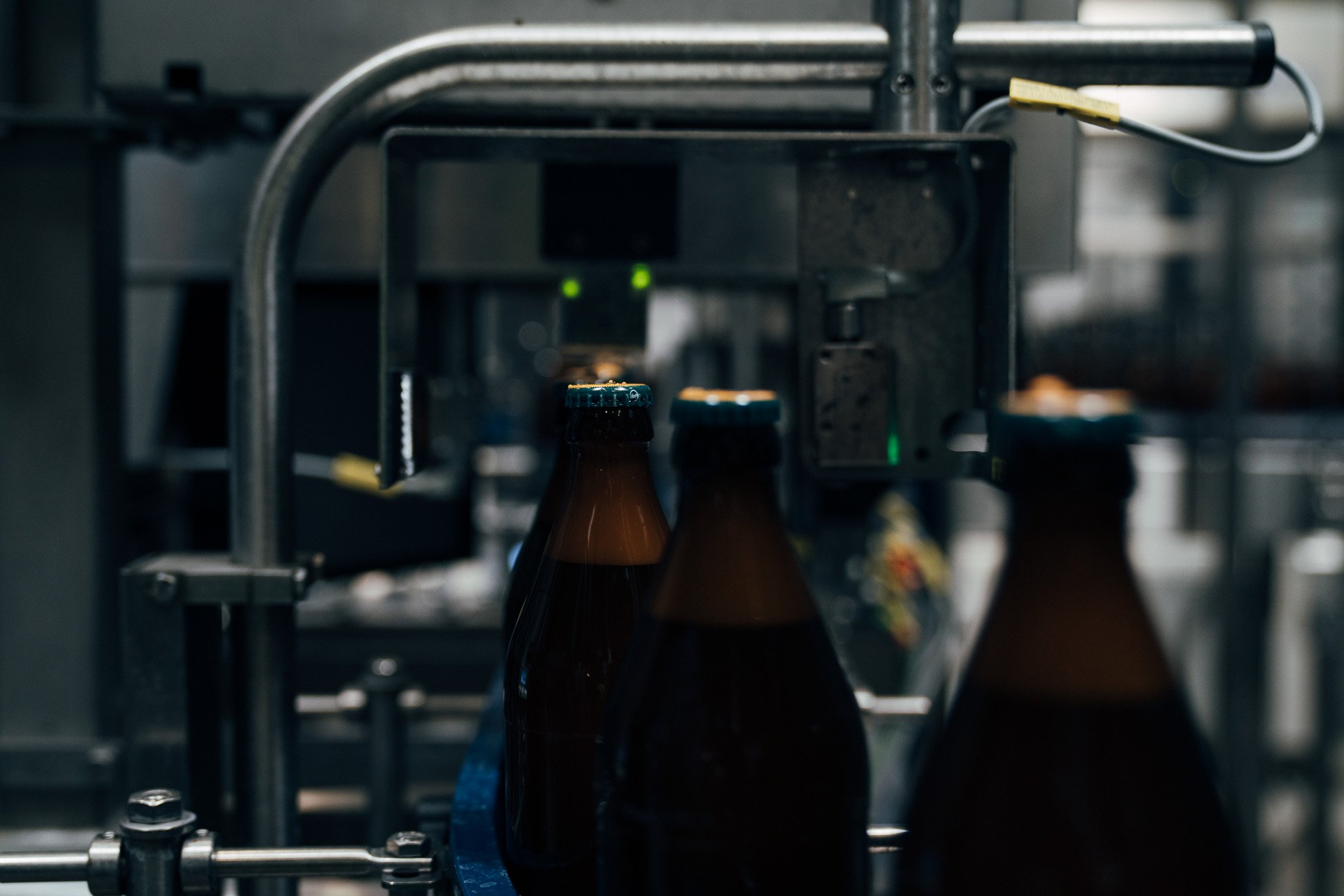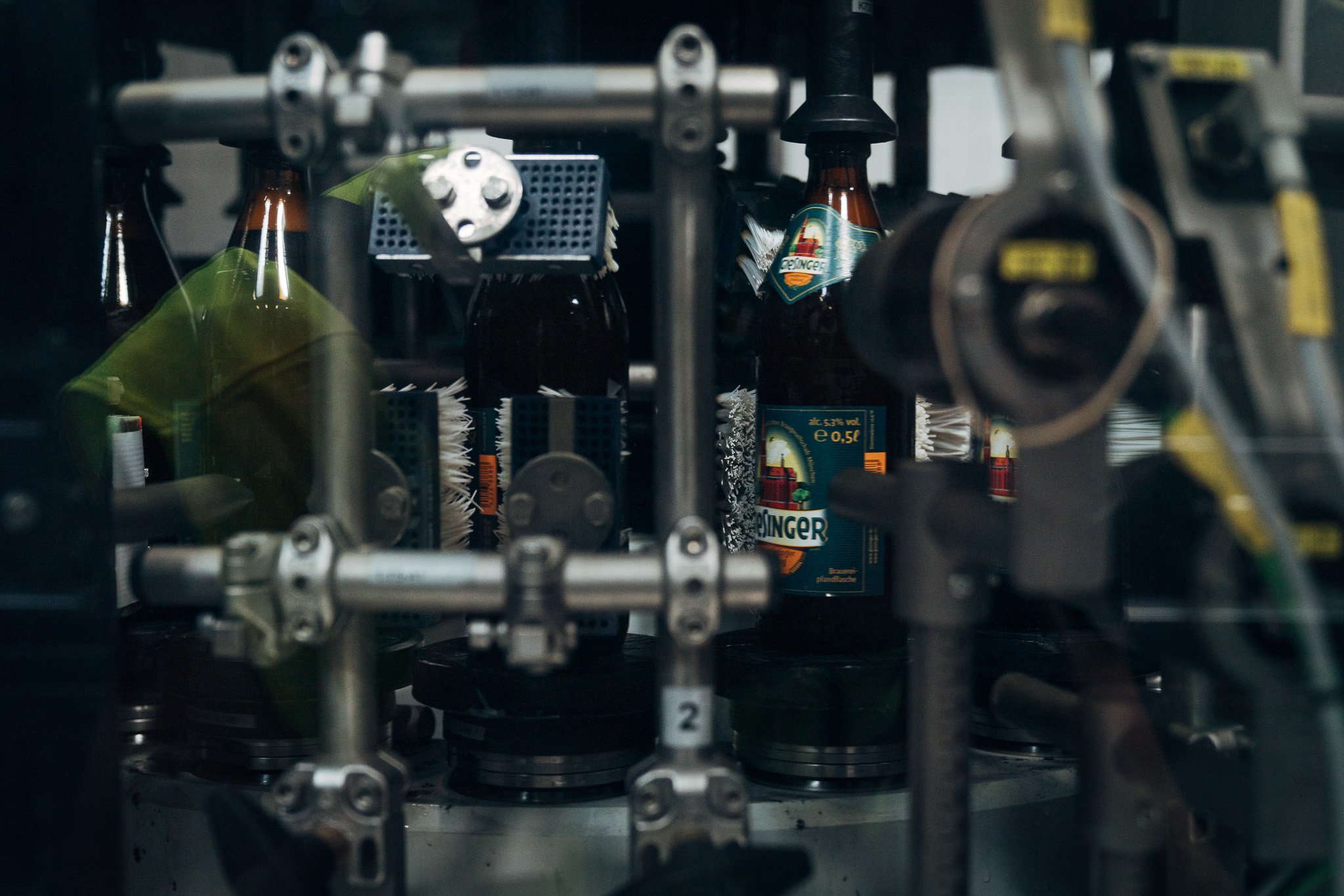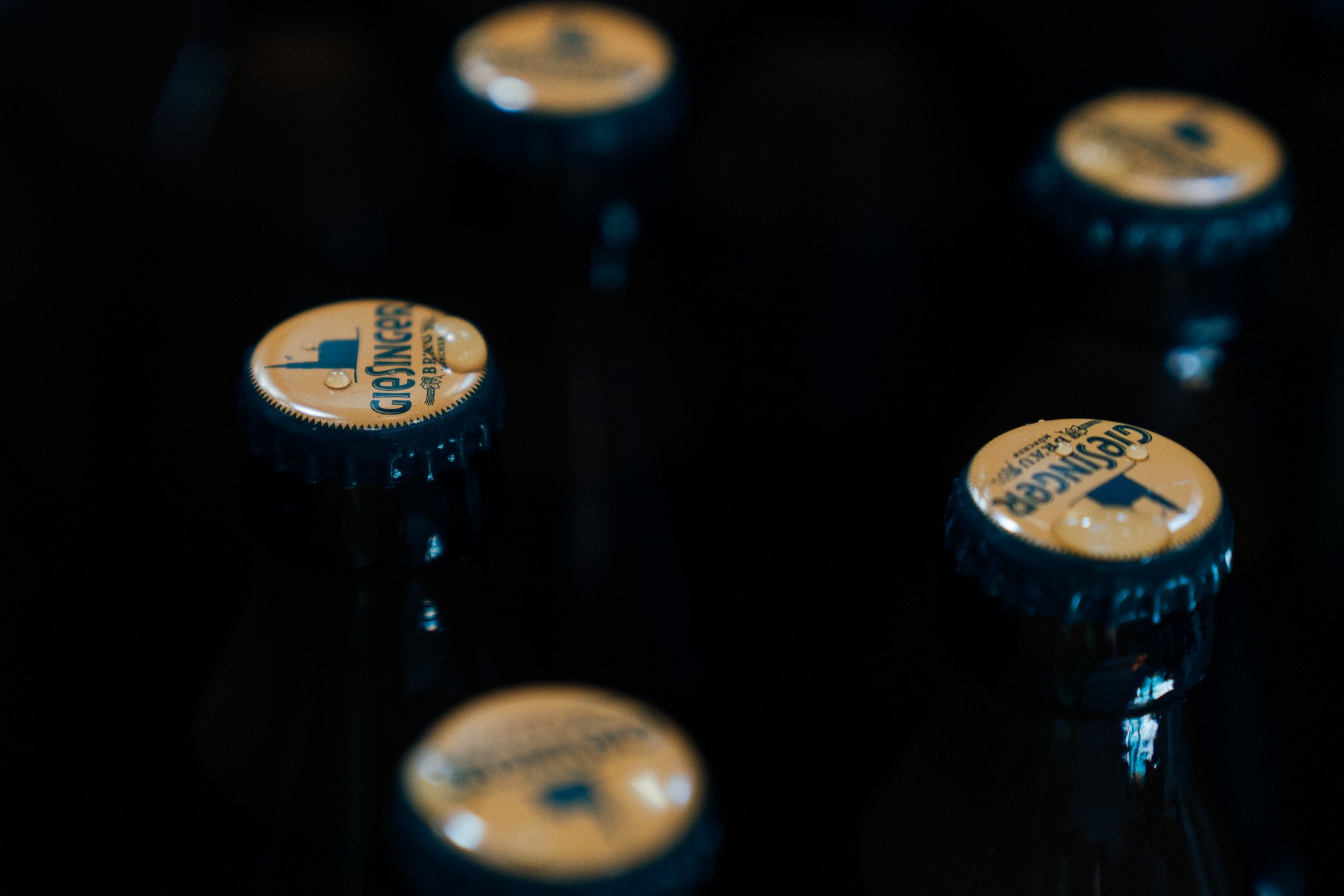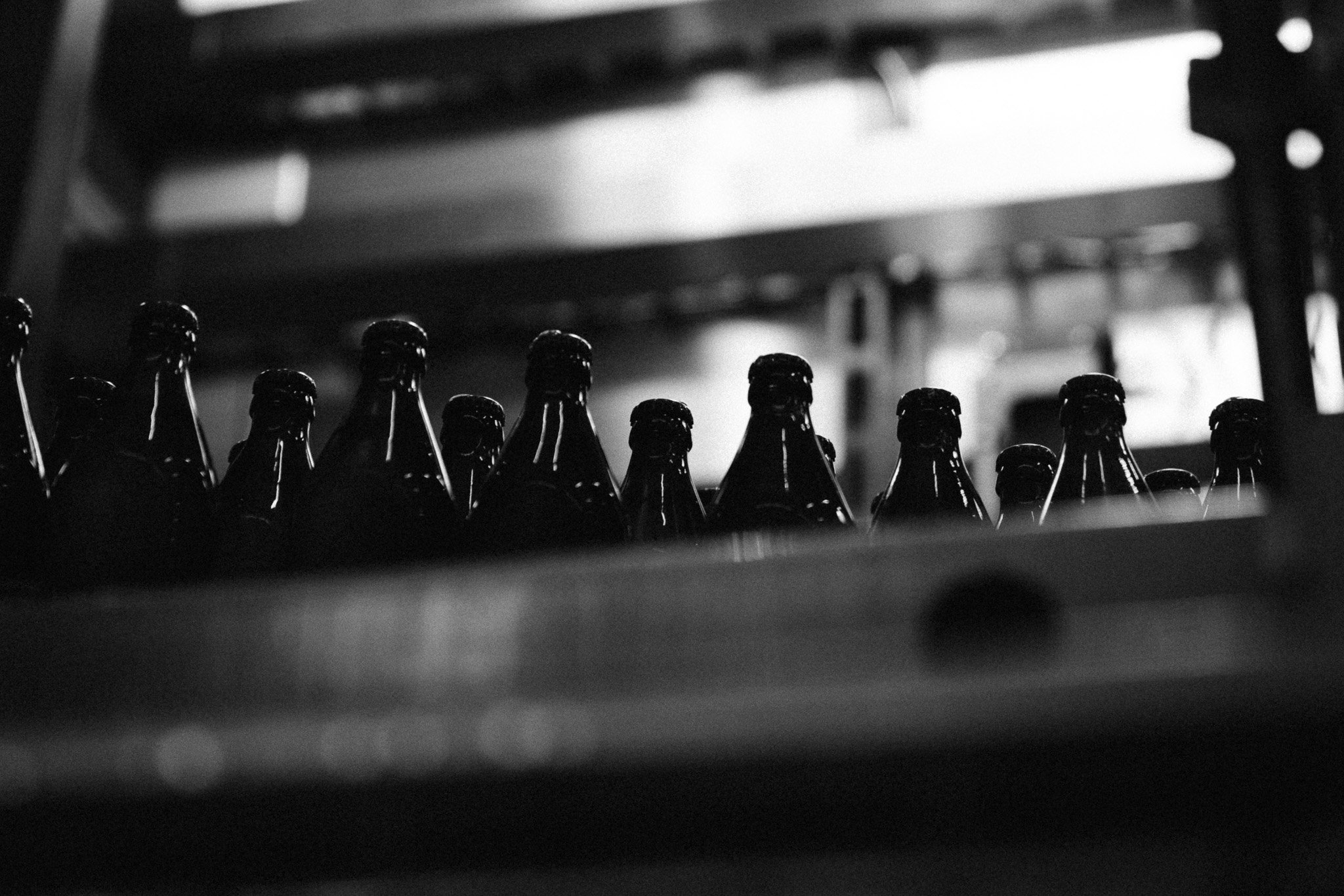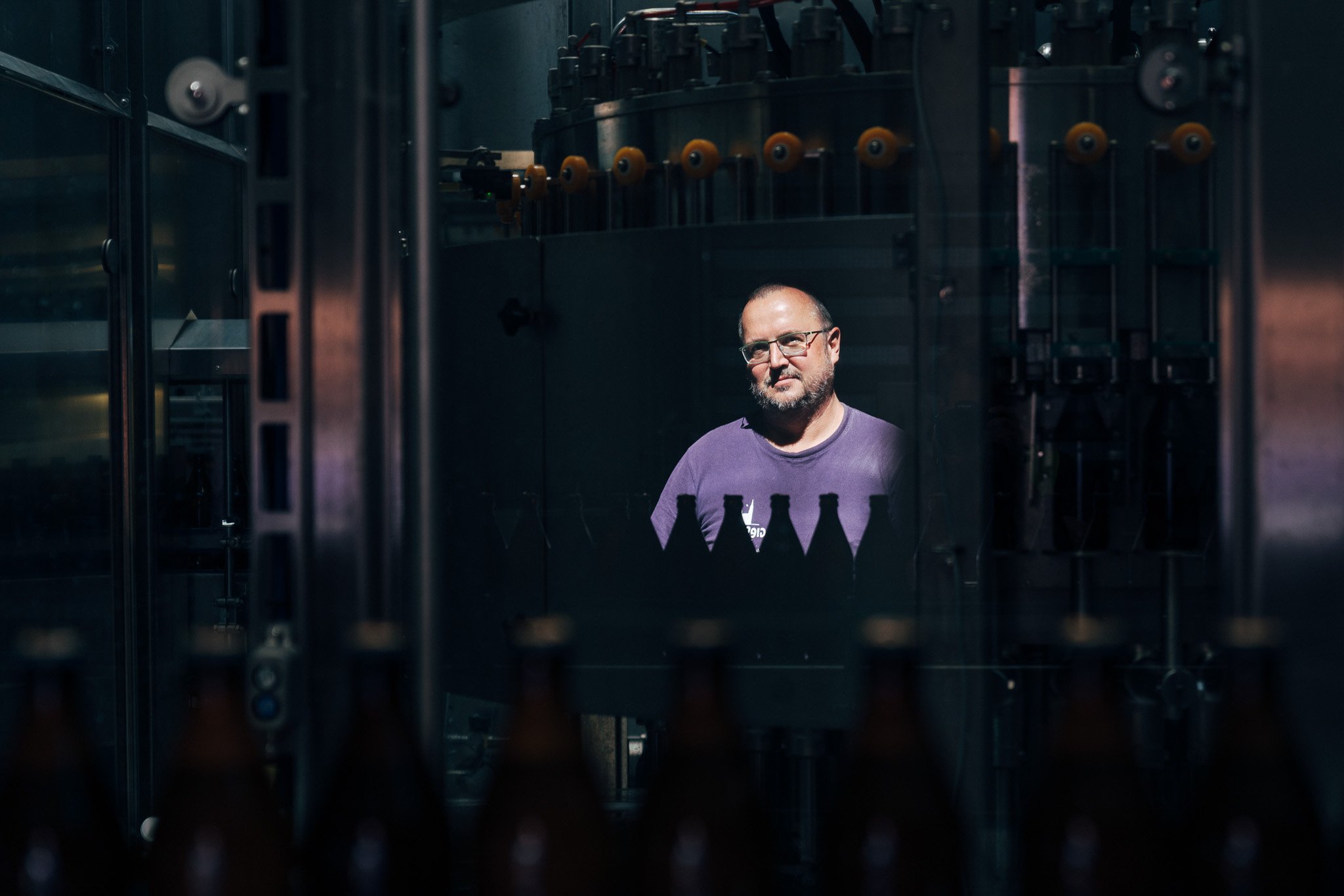Sie Lieben Auch in Schlechten Tagen — Giesinger Bräu in Munich, Germany
Steffen Marx doesn’t look like the scourge of Munich’s traditional brewers.
On an unseasonably hot afternoon in mid-May, he’s dressed—from the waist up, anyway—in a fluorescent yellow high-vis vest, his gut exposed, his jawline covered with a stubbly beard. Standing in the yard of his brewery, Giesinger Bräu, he is short and solid, with a squat bottle of beer in his hand, a glint in his eye and arms covered with tattoos: a maypole, hops, the brewery logo, the Munich skyline.
Photography by Holger Riegel
Perhaps, though, it’s the glasses—frameless, restrained, businesslike—that give us the best idea of who this man, by my reckoning the most compelling personality in Munich beer, really is.
Steffen, 45, may share a surname with a certain German political thinker, but unlike his namesake, he is 100% capitalist. Since 2006, he has deployed considerable guile and audacity to guide this brewery from a Giesing garage to a €20m (£16.8m) structure on the northern fringes of Munich, where the neighbours include BMW and Bayern Munich football club.
His piece de resistance is inside a concrete box in the yard. It’s a well, costing €1m (£840,000) and plunging 152 metres into the earth, from where it extracts pure Munich water. Given that he could’ve used tap water, it seems a bit extravagant—except that, to produce Münchener Bier, a term protected under EU Law since 1998, he needed real Munich water (the tap stuff comes from the Mangfall Valley in the countryside). So he built the well and produced his first Helles in 2021.
This is where things get interesting. Now he makes echt Munchener Helles, Steffen is—in theory—entitled to the benefits that accrue to the ‘Big Six’ Munich beermakers (Augustiner, Hacker-Pschorr, Hofbrau, Lowenbrau, Paulaner and Spaten) including, most symbolically, the right to pour at Oktoberfest. Indeed, that’s his plan—but, in this most conservative of major beer cities, where a strong Catholic tradition walks hand in hand with capitalism, could it prove a step too far even for Steffen?
***
Giesing extends from the banks of the river Isar up and over a hill in the southeast of Munich. It’s a historically working-class district that’s become somewhat gentrified in recent years, home to Munich 1860—the city’s other football club—and Germany’s first branch of McDonald’s, which opened in 1971. The spire of the Holy Cross Church, another local icon, features on Giesinger Bräu’s logo.
It’s a good name for an upstart brewery in a city somewhat defined by its wealth. Giesing is still home to more than its fair share of tiny, down-to-earth pubs (‘Boazn’), the city’s humble counterpart to the magnificent beer halls and biergartens owned by the Big Six. In the underpass that links the Holy Cross Church to Giesinger, meanwhile, there’s a mural featuring Hans Steyrer, the ‘Bavarian Hercules’ who led a procession from his Giesing inn to the Theresienwiese—where Oktoberfest is held—in 1879 but was stopped en route by the authorities. (Any similarities between Steffen and Steyrer may or may not be coincidental).
Beer is a key part of Giesing culture, something it shares with the rest of Munich. “In Munich, you can have Italian, Yugoslav, Spanish, Turkish, Indonesian and Chinese food, in some restaurants you can even eat internationally; other than that, you cannot eat in Munich,” said Viennese actor Helmut Qualtinger, rather waspishly, in a late 20th-century assessment of Munich’s culinary options. “The food in these restaurants plays a secondary role. It is a kind of garnish for the beer.”
Things have changed since Qualtinger—who died in 1986—cast aspersions on Munich grub, but one thing is still true: beer is everywhere in this city of 1.5 million souls, and it’s mostly Munich-brewed, too. The Big Six may vary in terms of ownership (Augustiner is independent, Hofbrau is owned by the Bavarian state government, Hacker is owned by Paulaner—itself 30 per cent owned by Heineken—and Lowenbrau and Spaten are both owned by AB InBev) but they operate in much the same way. They own dozens of biergartens and taverns, and supply beer to a huge variety of restaurants and bars, often on exclusive terms. There are rivals—Ayinger, Schneider Weiss and Tegernseer are the most significant—but Munich brewers dominate the city’s taps.
This domination extends, of course, to Oktoberfest. It’s a cherished tradition, but as beer writer Andreas Krennmair showed, it hasn’t always been the case. Beers from outside Munich were served at the annual Autumn shindig in the late 19th-century, and perhaps much more recently, if this caption of three women drinking Ayinger in 1953 can be believed—but ‘Munich-only’ is etched in stone now.
The roots of Munich’s reputation as the beer city par excellence, though, do stretch back into the 19th century, when writer August Lewald wrote that “Munich smells like hops” and locals consumed 535 litres per person a year. It was during this era that Munich billed itself as ‘The City of Art and Beer’, a reputation that has survived two World Wars, Nazism, and the emergence of Munich as an economic powerhouse, virtually intact.
There’s art at the Giesing brewery in Am Riesenfeld, of a kind: spray-painted images on the fermenting vessels, Voll Gut (‘Very Good’) graffitied on a wall. It’s all part of the brewery’s studied insurgent image, but Steffen is a genuine outsider.
He grew up in Anklam in East Germany, close to an island in the Baltic Sea called Usedom (“Look it up, there’s nothing to know,” he jokes), didn’t drink alcohol until he was 18 - somewhat unusual for a German man - and only came to the city courtesy of a stint in the German army. Brewing began in a garage, with the assistance of Tobias Weber, a master brewer, under a different name—Das Bierlaboratorium—and with a different focus, on craft styles, like fruit and spice beers. (Weber no longer works for Giesinger).
““Drinkers are moving to us, because they like the beer, they like the brand and they like us.””
There are impossible-to-ignore similarities to a certain Scottish brewery. Steffen is a great admirer of BrewDog, having visited Ellon and derived much of the funding for the brewery from crowdfunding—albeit, like BrewDog, not all or even most of it.
“BrewDog is an inspiration to us,” Steffen says of a brewery whose string of recent controversies have yet to impact significantly on their reputation outside of the UK. “We are the biggest crowdfunders in Germany in all food and drink; 9000 small investors have put in €10m [£8.4m].”
This helped pay for the new brewery, which opened in the summer of 2020, and for the 64 people employed there and in Giesing. Production stands at around 40,000 hectolitres a year, of which 90% is Munich Hells or Erhellung, an unfiltered pale lager that is the brewery’s flagship beer. Both are made with classic ingredients: hops from the Hallertau and Czechia, malt from Albert Müller and Weyermann, and yeast from Weihenstephan. (14 beers in total are made; the others are produced at the original site in Giesing).
Growth is a constant here: six new tanks will be added in the summer, potentially doubling production, Steffen tells me. “In Munich and the surrounding region, about 5m hectolitres of beer are drunk each year,” he says. “We produce less than 1% of that at the moment. Why couldn’t it be more?”
Why not indeed? The brewery is working hard to expand its customer base, with regular weekend tours and a smart taproom which, for licensing reasons, can host guests 70 days a year. Customers can come to the brewery and fill up their cars with 20-bottle cases of beer for a cheaper price than they’ll find elsewhere, too.
Steffen is a natural salesman, laughing and joking with one customer who’s filling a trailer with case after case of Munchner Helles. “How long is that for? Three weeks? No, two!” His laidback demeanour only changes when the subject turns to the big Munich breweries, who together make up the Munich Brewery Association (Verein Münchner Brauereien), an organisation founded in 1871 when Munich had 17 breweries. He is dismissive of their claim to represent the city’s tradition: “That’s bullshit,” he says. “It’s about money.”
As his admiration for BrewDog demonstrates, though, Steffen has no problem with making money—and he is clearly keen to be accepted into the club: above the exit from the taproom is an image of seven bottles of beer, the Big Six plus Giesinger. “Nobody from the big breweries [wants to] involve us. Nobody cares about us. But in the future, they need to move their asses and make a plan that includes us.”
Crowdfunding may be the key to unlocking the door to Oktoberfest, he believes. “We have a community built with our unfiltered beer,” he says. “We have built a brewery on that support. Now we have our filtered Munich beer, drinkers are moving to us because they like the beer, they like the brand and they like us.”
“But the most important thing is the taste—and [that attracts] the people.”
***
Steffen, a Prussian, is making his way in Munich by offering locals a different version of something they already love. The city also has a number of small ‘craft’ brewers, like Higgins Ale Works and True Brew, pumping out the hoppy ales and dense stouts that symbolise American beer around the world. And then there’s Gregor Fransson, whose bar Hop Dog is something else entirely.
Gregor, 45, opened Hop Dog in the summer of 2020, around the same time as Steffen’s new brewery but with rather less fanfare. Hop Dog, on Auenstrasse in a fancy neighbourhood across the water from Giesing, has three key offerings: high-end hotdogs, hard rock and metal, and beers from Franconia, the northern third of Bavaria which in my opinion is home to Germany’s most interesting and enduring brewing tradition.
For 20 years Gregor lived in Bamberg, Franconia’s brewing capital, where he worked first at Mahr’s, one of the city’s best traditional breweries, and then Weyermann, perhaps Europe’s most famous malt producer. Originally from Slovenia, he describes Franconia as his “homeland of choice”, but he couldn’t see himself setting up his business there. “Selling Franconian beer in Bamberg?” he says. “As we say in Slovenia: why would you bring a pigeon into Venice?”
In Munich, by contrast, Gregor really stands out. Franconia is not far away, but its beer barely makes a dent here—so his 15 taps, mostly composed of Franconian lager, are a novelty. It’s a labour of love. He owns the kegs, which he drives to Franconia every three or four weeks to be filled at the region’s finest breweries: Spezial in Bamberg, Zehender in Monchsambach, Sauer in Strullendorf, to name three. He knows the brewers so they sell him the good stuff, he says.
And what about his customers—who are they and what do they make of this Franconian beer? “This is a very open town, a very cosmopolitan town—we have a lot of students, a lot of big businesses, a lot of expats,” he says. “I would say 60 percent of the people who come to this bar are expats.
““Munich will never be an IPA city.””
“My customer base is very diverse, including what we call here, the Munchener Grantler [‘grumpy Munchener’, a folkloric stereotype]. They say “just give me a Helles.” I give them our staple, Knoblach Sommerbier: they drink it and they like it. I tell them it’s a Franconian beer. “What, really, Franconian, not Munich?” And then they have another one!”
Gregor accepts that he will always represent a niche in Munich, but things are evolving, led by the likes of Higgins Aleworks, run by Paul Higgins, a former homebrewer from New Jersey. “The new breweries are popular not just with teenagers but middle-aged people too,” he says. “The scene is developing in the right way. Munich will never be an IPA city. We’re not throwing out tradition, but adding something new.”
And then there’s Giesinger. “Steffen is a very, very clever businessman,” he says. “And he built the well—I don’t know how much sense that makes but that’s Munich, it’s about tradition! I think the beer has really picked up in terms of quality, too. I would say that the brewery has a really nice, shiny future.”
***
Fatma Herle leads the tours at Giesinger brewery: four on a Friday, four on a Saturday. This warm, chatty former social worker is a key public face for a brewery trying to stand out in a city that keeps its cards close to its chest. Aged 47, she’s a genuine modern Munchener, born and bred here of a Turkish father and German mother; her husband Markus hails from Giesing, and, she says, convinced Steffen to change the name of the brewery from Bierlaboratorium.
She worries about gentrification in Munich (“Who wants to live in a city where nurses and teachers can’t afford to stay?”), pointing out that that’s the reason why Giesinger had to move from its home neighbourhood. And she knows about Oktoberfest. “Every tour [there] is the same question,” she says. “When are you going to the Weisn?”
The interest in the German press—from Bild, the country’s answer to The Sun, to the sober, socially liberal Süddeutsche Zeitung—says the same thing. This subject has caught the imagination of beer-loving Germans.
Not everyone wants to talk about it, though. Emails to the Munich Brewery Association for this article went unanswered; there was no reply from the Munich Oktoberfest Museum, which is closed for refurbishments until September; and Augustiner’s press man, speaking on the phone, was very polite but insistent that the company wouldn't be answering any questions.
Steffen is not easily put off. He knows his arrival at Oktoberfest is a few years away—he reckons he’d need at least 7000 hectolitres for the 16 to 18 days of the festival—but he’s resolute. “There’s two ways into Oktoberfest: own a tent, which would take 50 years, or serve beer in one of the independent tents. That’s possible.”
He mentions Schottenhamel, where the Mayor of Munich taps the first beer of the festival, as one option (In response to an email asking if that was likely in the next few years, Schottenhamel’s owners said “we do not have such plans and information at this time, as we have a cooperation with Spaten Bräu until further notice”). The Mayor, Dieter Reiter, is a friend of the brewery, having commissioned beer from them in the early days for a political campaign. He turned up to the opening of the new brewery, too.
Given that the city organises Oktoberfest, that would suggest a possible opening for Giesinger. And who’d bet against Steffen, considering what he’s already achieved? Just don’t put your shirt, or hi-vis tabard, on it.



